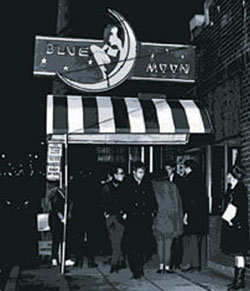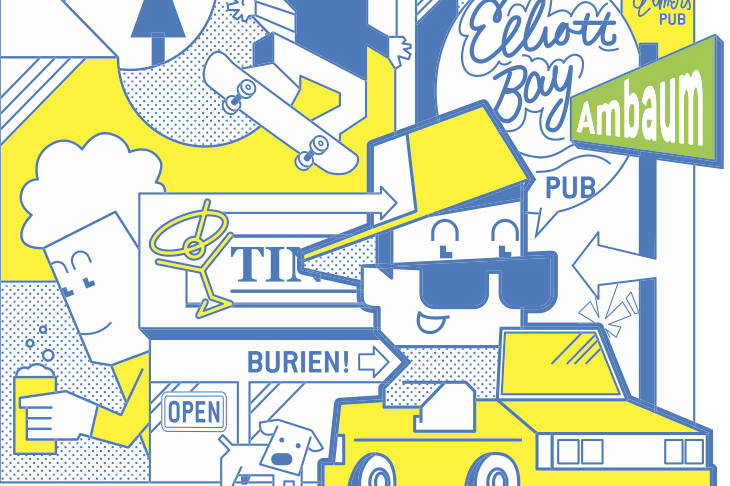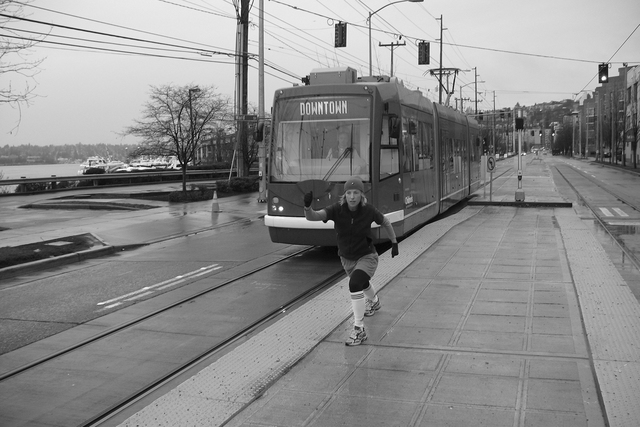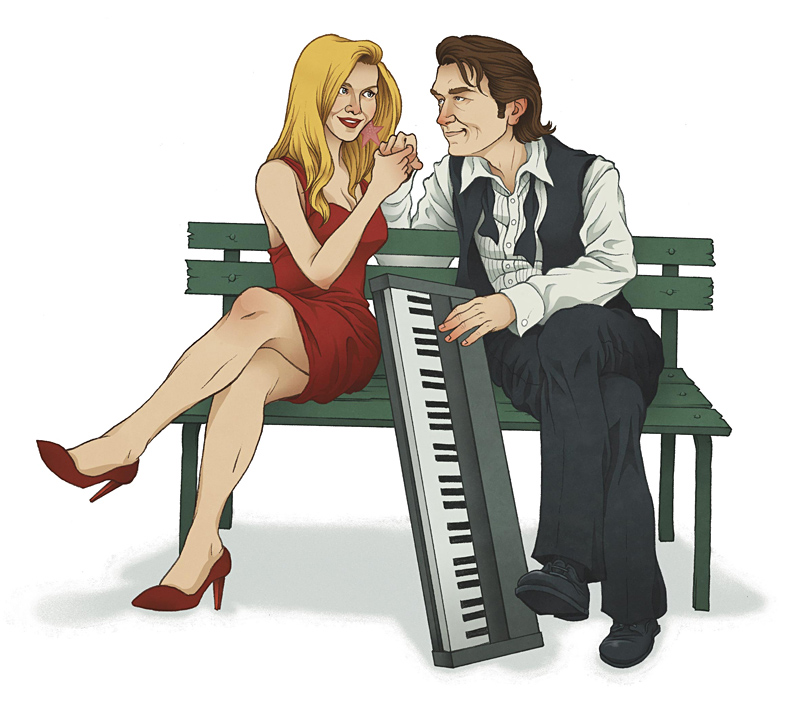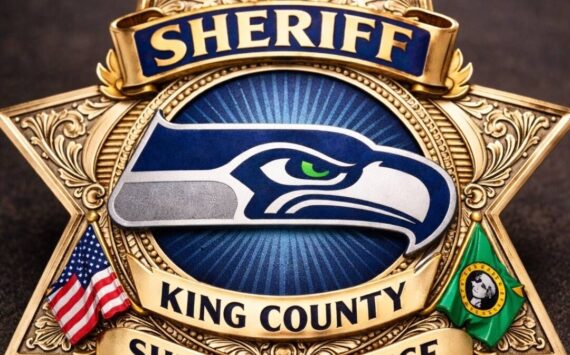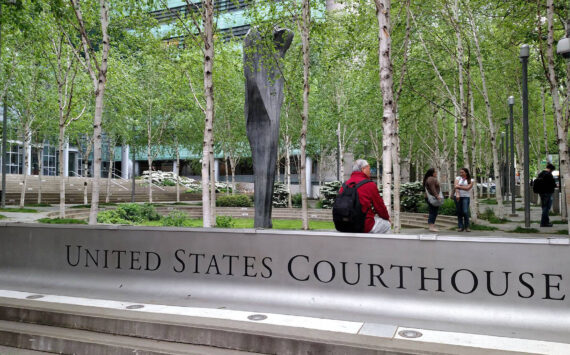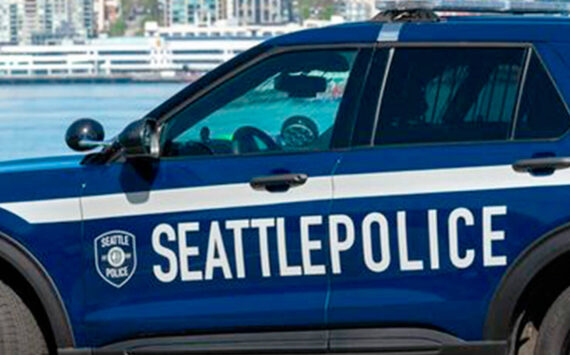There’s a Grateful Dead lyric that adroitly sums up the Blue Moon Tavern’s decades-old modus operandi: “One man gathers what another man spills.”
Fittingly, the historic (established 1934) University District watering hole once sponsored a long-running Dead bootleg night every Sunday until the man with the cassette tapes “got tired of doing it,” says Blue Moon owner Gustav “Gus” Hellthaler, a Fremont resident and carpenter by trade.
Seated at a circular wooden table near the entrance, the mustachioed Hellthaler—clad in a plaid flannel shirt and sporting some fresh stitches on his thumb from a woodworking accident—consumes shot after shot of Lazy Boy Hefeweizen as he surveys the circus of humanity that evolves virtually every day at his shopworn joint. You know the famous former clientele—Allen Ginsberg, Dylan Thomas, Tom Robbins. But the Moon’s regulars are a charmingly ragtag outfit of gypsies, hippies, bikers, artists, drunks, punks, poets, pagans, dockworkers, street performers, factory girls, associate professors, pocket philosophers, jazz trumpeters, and wanderlust-stricken hobos—life’s colorful seepage. Hellthaler rescued the Moon from a surefire shuttering in 1982 when he and a couple partners (whom he bought out in 2003) purchased the tavern under the corporate moniker Three Fools Inc.
If blue-collar Seattle is eroding, then the Blue Moon is one of its last vestiges, a tipsy little fly in the world-class ointment.
Loud Latin music blares overhead as a bald, goateed gentleman approaches Hellthaler’s table and jokingly announces that he must “go home to the wives and children, back in Polygamy Heights.” Once his comrade bids adieu, Hellthaler turns to the bartender in charge of the stereo and barks: “Tom, can you please turn that shit down so I can hear myself talk?”
The barkeep grudgingly obliges, allowing Hellthaler to launch into a rant about how modern-day Fremont is “totally fucked.”
“I think [Mayor] Nickels is anti–blue collar,” says Hellthaler, a lifelong Democrat. “Nickels’ version of Seattle is to make it the West Coast’s largest gated community. You’re not allowed to talk about class warfare in the U.S., but it’s waged regularly. All the inherent charm in Seattle that was here in the ’70s is gone.”
If blue-collar Seattle is eroding, then the Blue Moon is one of its last vestiges, a tipsy little fly in the world-class ointment. For years, despite a somewhat dubious reputation, the city essentially let the Moon be, knowing that its clientele wasn’t exactly setting the world on fire.
Enter Nickels and City Attorney Tom Carr, two men Hellthaler claims are responsible for the fact that he’s quietly decided he must sell his beloved Moon—which was narrowly denied landmark status in 1990 when the city’s Preservation Board deadlocked—despite the fact that his lease doesn’t expire until the establishment’s hotly anticipated 2034 centennial.
“Through back channels, the city has made it be known that they’re not going to let me sell beer or wine,” claims Hellthaler, whose license comes up for review and renewal in September. “A fellow I know who has contacts inside the city has warned me that the city’s out to get me. I am forced to sell the Moon if the city threatens not to renew my beer and wine license, and the city’s aware of that.”
“That’s the stupidest thing I’ve ever heard,” replies Carr. “The city hasn’t decided what to do with him. We’ve always wanted to work with Mr. Hellthaler. The thought that the city has liquor authority is not true.”
That’s the duty of the State Liquor Control Board, which says it has yet to receive any formal objections to the Moon’s impending license renewal. But Hellthaler and his attorneys, Tom Nast and David Osgood, claim that the liquor board is now a toothless tiger.
“What we have had in the past couple years is a tectonic shift in the liquor board,” says Osgood. “They’ve shifted from being an independent body to just sort of becoming a rubber stamp for local authority. They’ll automatically grant requests and let an administrative law judge go through the process, which is very expensive and very time-consuming. It’s very difficult because administrative law judges very rarely reverse a liquor board decision.”
The Moon inadvertently got caught in this trap when, in December 2004, Hellthaler applied for an enhanced license that would have permitted him to serve hard booze. On Feb. 10, 2005, Assistant City Attorney Ed McKenna sat down with Hellthaler and made it clear that the city would not object to his request if he agreed to sign a Community Good Neighbor Agreement (CGNA), whereby the Moon’s staff would abide by a laundry list of security requirements and community oversight. Hellthaler declined, citing coercion and calling the document heavy-handed and unconstitutional, prompting the city to file a written objection with the liquor board a week after the meeting.
In April 2005, the liquor board denied Hellthaler an enhanced license, prompting Hellthaler and his attorneys to request an administrative hearing. This past March 30, Judge Christy Gerhart Cufley upheld the liquor board’s denial after protracted proceedings in which the city’s legal team painted the Moon as a haven for drugs and scofflaws, citing the tavern’s own “86’d log” and a series of undercover pot busts on or near the premises.
“In three years of undercover operations, they’ve managed to buy almost an ounce of marijuana, and none of that can be attributed to management or staff,” counters Osgood. “They’re very good at making mountains out of molehills. When they haven’t been able to get an all-out revocation, they’ve been sitting down and saying they’re going to reject a renewal unless you sign a CGNA. These things are completely unauthorized by ordinance and law. And in Gus’ case, it’s amounted to a city takeover of his business.”
Responds Carr: “They’re selling a substance [i.e., alcohol] which causes problems, and what we’re trying to do with the CGNA is to get them to act responsibly. [Gus has] made his own bed. We never, ever wanted to deny him a license; we just wanted to help him deal with the drug problem he was creating in the neighborhood.”
The aforementioned “86’d log” contains amusing annotations such as “Not a bad guy, just too many customers,” and “86’d for being a Miller beer drinker.” Here’s March 18, 2004: “Slow, but cheerful . . . almost quaint closing.” Would that it were.
